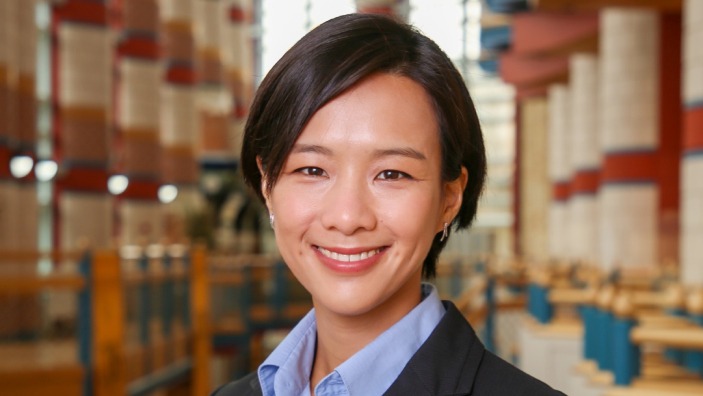About
Name: Christine Chen
Nationality: Australian/Taiwanese/British
Programme: Cambridge EMBA 2021
Current role: Senior Engineering Manager at Google
Studying part-time for a PhD in Engineering at Cambridge
Industry sector: Technology

Christine was the recipient of the 2021 Cambridge EMBA Scholarship for Women.
Christine’s journey
Christine Chen (EMBA 2021) is a leader experienced in the tech sectors in Europe, Australia and Asia, ranging from defence, telecommunications, IoT and digital technologies across multinationals, startups and think-tanks.
She was the recipient of the 2021 Cambridge EMBA Scholarship for Women and has been recognised as one of Sydney University’s 10 Sydney women to watch (2018), Taiwan’s 40 under 40 Women in Tech (2017), and Sydney’s Young Professional Engineer of the Year (2015). She is currently a Senior Engineering Manager at Google and is studying part-time for a PhD in engineering at the University of Cambridge.
Can you tell us about yourself and your career?
I’m a Senior Engineering Manager at Google. Previous to Google, I worked at multinationals, startups and think-tanks in the UK, Australia and Asia in the tech, IoT and defence industries. I’m also studying a part-time PhD in Engineering at Cambridge and serve on the Women in Digital Pivot Strategy Steering Board at the City of London.
How do you think the representation of women can be improved in executive leadership positions?
Tech and engineering in general have made strides in diversity since I went to university, which is very encouraging. I see women in all kinds of roles at Google and in tech, compared to the <10% we had in my undergraduate class; it’s amazing to see these changes and improvements. We are also seeing those changes reflected at the executive level, but it does take time for it to be reflected at such a senior level. To me, this means we should continue our efforts to improve diversity at all levels.
Why did you decide to do an Executive MBA?
I’m very lucky my company and industry don’t require me to have an Executive MBA in order to advance, but doing an Executive MBA was something I’ve always wanted to do. I wanted to be surrounded by people who want to leave an impact on this world. I wanted to have discussions on world issues and the various possibilities to solve them, and I wanted to work alongside people who actively work to be part of the solution. It’s fair to say the Executive MBA didn’t disappoint.
What skills did you learn during the Executive MBA?
I learned how to translate strategic thoughts into ideas, how to take an analytical approach to validating those ideas, how to communicate them to stakeholders and bring everyone else along. Time management and ruthless prioritisation are skills most of us perfected during the Executive MBA. Ruthless prioritisation is an underestimated skill.
How did you achieve a work-life balance when studying for an Executive MBA?
To be honest, you don’t. The idea that there’s some magical formula that has allowed us to do it all without any sacrifice is a lie. Doing an Executive MBA was important to me, so I prioritised what was important, and deprioritised things that were less important, or can afford to be pushed out a bit, such as sleep! I became very good at using scrap time. I reduced extracurricular activities, blocked out time after work and every weekend for study and research, brought my laptop with me on holidays, and downloaded papers onto my phone so I could read them when I was at the airport or on the tube. All of us have made certain sacrifices, I think the same lesson can be applied to life – if something is important to you, you should and would be willing to put in the work required to make it happen.
What surprised you about the Executive MBA programme?
This is specific to Cambridge, but the diversity of the cohort surprised me. I knew Cambridge was a tech-focused business school, but I wasn’t expecting to study amongst friends who were entrepreneurs, investors, charity executives, doctors, engineers, military personnel, and many more. The first week was full of surprises learning about each other’s work and the journey that’s led us to Cambridge.
What impact has the Executive MBA had on your career?
In terms of impact, I always go back to the people. I’ve made friends at Cambridge I hope will last a lifetime, people that inspire me, challenge me, and encourage me to do more and see more. In addition, my PhD research is a direct extension of my Executive MBA research, which I’ve since presented to a few company boards and taught a lecture on at Cambridge. I’ve met some of the kindest, funniest, most generous and intelligent people I know through Cambridge and that, to me, has been the biggest impact and gain from the Executive MBA.
What advice would you give to other women considering studying for an Executive MBA?
It’s not an easy journey, but nothing worth doing is easy. Think hard and be honest with yourself about the reasons why you want to do an Executive MBA and the tangible steps you’re willing to take to make room to fit it in. For me, I would have regretted it if I hadn’t given it a go, and that was enough reason for me to make every effort I could. Different people have different reasons and motivations, it’s important to spend time reflecting on your motivation and remind yourself during the Executive MBA of the reasons why you’re there.

